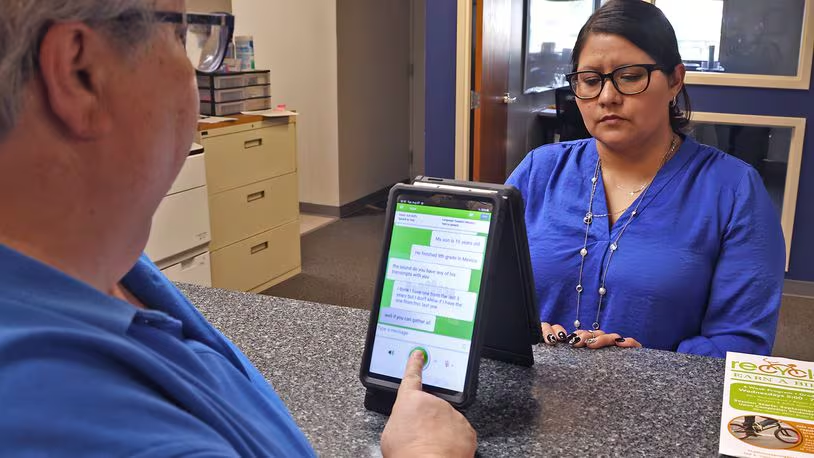Springfield schools has ‘great success’ with new translation devices
The Clark County Combined Health District has also purchased some devices after the school district’s success with them.

The Springfield City School District has spent the last several months testing out a new translation device that has “had great success,” a school official said, resulting in the Clark County Combined Health District purchasing a few as well.
Shay explained she would hold a microphone button on her side and talk, then it comes out in print form in whatever language the guest chose and it speaks it back to them, and vice versa. It also doesn’t store any information and erases after you’re done.
TranslateLive is a device that has two computer tablets that are joined together and has translation software on it.
“I would be the host and then we have a guest. There’s a menu to pick the language that they want and it’s not even just the language, but they can also pick dialect … Depending on what country you come from, there’s a little bit of differences so it gets into the dialect level,” said Pam Shay, director of federal programs at Springfield City Schools.

The device also has a barcode that people can scan and the software will come up on their phone if guests are more comfortable using their phone to talk.
The district purchased 10 devices in April to pilot them, then another 30 this summer to distribute for the beginning of this school year. They cost between $2,500 and $3,000 per device for a four-year contract for the program.
“We just had great success across our buildings,” said Shay, “We’ve just had tremendous success out of this.”
Every building in the district has one or two devices, as well as the key departments, including with the attendance officers. Shay said the front offices have one so as parents come in with questions they can interact if a live translator isn’t available, nurses in the clinic can use them to ask students how they’re feeling, mental health and behavior counselors have them and can work with a single student or small groups, they’ve been used in classrooms for small group activities, and they have been used on phone calls.
“If a parent calls in and they have questions, we can have that device sitting and we put the speaker next to the phone and we operate it that way and it helps there,” Shay said.
Along with this new device, they still continue to use their other resources such as translation cards and Google translation, because “it’s just another tool available.”
HEALTH DEPARTMENT
After the district had initial success, Shay showed a group of about 25 people from different agencies the devices, including Health Commissioner Chris Cook, of the Clark County Combined Health District.
“She got the group of us together, showed us how they work, and she actually had a Haitian Creole speaking staff member of Springfield City Schools showing us and kind of vouching for the accuracy of it, which was meaningful to me,” Cook said.
Cook said the health district used some of a grant to purchase four of the devices. Two are at the main office on Home Road, one is at the High Street office and one is used in different areas.

ENGLISH-LEARNING POPULATION INCREASING
Four years ago, Shay said the district’s English Language Learner (ELL) population started around 250 students, and they are now up to about 1,150 to 1,200 that meet the national and federal standards of needing services. There is a total of about 1,750 to 1,800 students who are non-English natives, and Shay predicts there will be 2,000 students by January.
“The reason I give you a range is because we are still enrolling them every day … What we’ve been experiencing in the last couple of years is we have continuous enrollment all year round,” she said. “While (all) the students (are) not qualified for the highest level of support, we still have to provide them support, but more importantly we have to provide the parents support. The students may have some English they picked up along the way, parents may not.”
Shay added they hosted their ELL family orientations a few weeks ago for about 60 parents, where they invited families that were enrolling their kids for the first time.
“I spent an hour and a half just talking with them when we had translators there, telling them the rules and regulations, helping them understand how education is in the U.S., and just explain some of those things,” she said.
One thing Shay mentioned is that with non-native English families continuing to come to Springfield and the area, they need financial support as well as other types of support with things such as translating forms and state testing.
“What programs are available, how can state agencies start translating a lot of their forms into the languages that we need that all the different agency offices have to use here in Springfield, like Job and Family Services, (those) in the medical world, and a lot of different areas,” she said.

Shay said they’ve talked with state agencies about having some sort of waivers for the testing scores to not impact district scores for those students who classify as immigrants by the federal and state definition and have been in the U.S. for less than three years.
“We’re graded on how well our students perform in different state tests, but imagine if you come to the U.S. You come to Springfield on day one, you enroll on day two, on day three we ask you to sit down and take a high level English test and you’ve never spoke English in your life. But the scores of the students are recorded and they impact our overall scores,” Shay added.
Shay said the district is currently looking for bilingual assistants.

